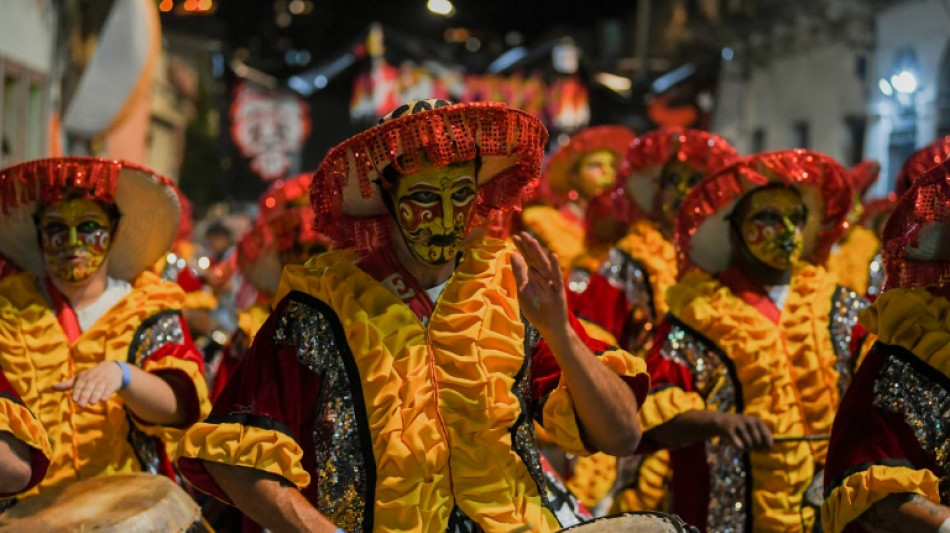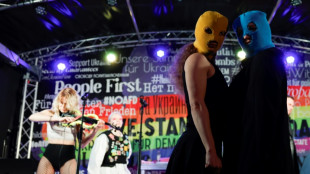
-
 England-born Inglis relishes 'special' century for Australia
England-born Inglis relishes 'special' century for Australia
-
Pussy Riot stages pre-election Berlin show for Ukraine

-
 Leverkusen ease to victory at Kiel to trim Bayern lead
Leverkusen ease to victory at Kiel to trim Bayern lead
-
'Now it's over' says Hermoso after Rubiales found guilty

-
 Germany on eve of vote expected to see far-right surge
Germany on eve of vote expected to see far-right surge
-
Spurs revitalised after Ipswich rout: Postecoglou

-
 Russell misses prove costly as England edge Scotland in Six Nations
Russell misses prove costly as England edge Scotland in Six Nations
-
Milei says welcomes Trump plan for reciprocal tariffs

-
 Premier League title out of Arsenal's control, says 'angry' Arteta
Premier League title out of Arsenal's control, says 'angry' Arteta
-
Asensio double punishes Jorgensen howler as Villa beat Chelsea

-
 Lille deepen Monaco's woes
Lille deepen Monaco's woes
-
Alvarez double takes Atletico top with Valencia win

-
 Norwegian film 'Dreams', Australia's Rose Byrne win at Berlin
Norwegian film 'Dreams', Australia's Rose Byrne win at Berlin
-
French star Jaminet returns after ban for 'stupid' racism

-
 England edge Scotland in Six Nations thriller
England edge Scotland in Six Nations thriller
-
England edge Scotland 16-15 in Six Nations thriller

-
 Israel stalls Palestinians' release after six Gaza hostages freed
Israel stalls Palestinians' release after six Gaza hostages freed
-
Pope suffers respiratory attack, condition critical: Vatican

-
 French convict freed in murderous ambush is arrested in Romania
French convict freed in murderous ambush is arrested in Romania
-
Andreeva, 17, makes WTA history with help from LeBron and Federer

-
 Nowitzki 'disappointed and sad' for Doncic after trade
Nowitzki 'disappointed and sad' for Doncic after trade
-
Japan's Forever Young wins $20mln Saudi Cup

-
 One dead, several police wounded in 'Islamist' knife attack in France
One dead, several police wounded in 'Islamist' knife attack in France
-
Ireland hail supersub energy, Wales see solace in defeat

-
 One dead, several police officers wounded in 'Islamist' knife attack
One dead, several police officers wounded in 'Islamist' knife attack
-
Arsenal's Premier League title hopes suffer Hammer blow

-
 Rublev outlasts Draper to take second Doha title
Rublev outlasts Draper to take second Doha title
-
Inglis trumps Duckett as Australia defeat England in record chase

-
 Israel suspends prisoner release after six Gaza hostages freed: sources
Israel suspends prisoner release after six Gaza hostages freed: sources
-
One dead, several police officers wounded in knife attack in France

-
 Thousands join Hungarians judges' rally
Thousands join Hungarians judges' rally
-
Andreeva, 17, becomes youngest WTA 1000 champion

-
 Arsenal title bid rocked by West Ham, Man Utd rescue Everton draw
Arsenal title bid rocked by West Ham, Man Utd rescue Everton draw
-
Prendergast leads Ireland to victory over Wales in Six Nations

-
 France says convict freed in May shootout arrested in Romania
France says convict freed in May shootout arrested in Romania
-
'Soft' Man Utd have to survive this season, says Amorim

-
 Pakistan coach says 'match-winning' fast bowlers key in India clash
Pakistan coach says 'match-winning' fast bowlers key in India clash
-
Zelensky 'not ready' to sign minerals deal with US: source

-
 Fernandes inspires Man Utd fightback for Everton draw
Fernandes inspires Man Utd fightback for Everton draw
-
France's agriculture show, an outlet for angry farmers

-
 Brignone claims Sestriere giant slalom double after Shiffrin flops out
Brignone claims Sestriere giant slalom double after Shiffrin flops out
-
Two in a row for Merlier at UAE Tour

-
 Clash with Pakistan just another game, says India batsman Gill
Clash with Pakistan just another game, says India batsman Gill
-
Londoners march in support of Ukraine to mark three years of war

-
 Duckett ton drives England to 351-8 against Australia in Champions Trophy
Duckett ton drives England to 351-8 against Australia in Champions Trophy
-
Syrian suspect in Berlin stabbing wanted 'to kill Jews': police

-
 Hamas frees 6 Israeli hostages in latest transfer under truce
Hamas frees 6 Israeli hostages in latest transfer under truce
-
China's EV maker XPeng eyes doubling global presence by year's end

-
 Hamas frees 5 Israeli hostages in latest transfer under truce
Hamas frees 5 Israeli hostages in latest transfer under truce
-
Germany on eve of elections under shadow of US-European rift


Las Llamadas: Uruguayan festival born from African struggle
As a little boy, Cesar Pintos -- now 86 -- played "drums" with his friends in the streets of Montevideo's black-majority neighborhoods, beating tin cans with twigs to ancestral rhythms brought to Uruguay by enslaved Africans.
It was the 1940s, barely 100 years since the abolition of slavery in the South American country and a period of explosive growth for candombe -- a uniquely AfroUruguayan music style.
"Black people brought it here," Pintos told AFP of the music, which UNESCO recognized as a piece of Uruguayan cultural heritage "transmitted within families of African descent."
"They brought it in their heads, because they had nothing" in the line of possessions, said Pintos.
As an adult, he started his own "comparsa" of drummers and dancers from his Cordon neighborhood, one of the birthplaces of candombe.
The group, named Sarabanda, participates to this day in "Las Llamadas" -- an annual parade hailed as a celebration of African heritage and the highlight of Montevideo's carnival.
Las Llamadas translates as "The Calls," from the ancient practice of beating drums to "call" the community together.
Every year since 1956, dozens of comparsas march in the Montevidean city center with painted faces and elaborate costumes that hark back to a distant past on a foreign continent.
In a two-day carnival competition watched by thousands, they beat out candombe tunes on wood and animal skin drums as the performers dance.
- From 'objects' to musical stars -
Today, Las Llamadas is a celebration for all race groups -- in fact many comparsas are majority white.
But the origins of candombe music are found in black struggle.
Montevideo was an important entry port for enslaved Africans brought by Europeans to South America from the second half of the 18th century.
By the end of the 1700s, over a third of the capital's population were African descendents, according to the municipal website.
For generations of enslaved people and their offspring, drumming and dancing in their free time was a way to hold on to distant ties to the mother continent.
When slavery was abolished in Uruguay in the mid 19th century, AfroUruguayans created mutual aid societies, whose lively meetings gave birth to candombe.
- 'Fundamental' -
"The drum for us is fundamental... It allows us to protest when we need to make ourselves heard, and also to have fun," Alfonso Pintos, the 59-year-old son of Cesar, told AFP.
He pointed to the role of comparsas in drumming up Uruguayan resistance to apartheid in South Africa, and closer to home, the country's own military dictatorship of the 1970s and 1980s that displaced many black Montevideans.
Today, Las Llamadas is more party than protest, but the fight for equality is not over.
According to the World Bank, Uruguay stands out in Latin America for its low level of inequality, though black people are more likely to be poor.
The last inequality report by the government's INE statistics institute reported in 2014 that more than half of Afrodescencents did not have their basic needs met, compared to less than a third of whites.
Nine in ten AfroUruguayans aged 20 to 24 do not obtain a tertiary education.
- True to its roots? -
Just over 255,000 people out of about 3.2 million Uruguayans identified as Afrodescendents in the last census.
It is a shrinking ratio of the population -- about 8.0 percent compared to more than a third 200 years ago.
"Uruguay really took very seriously the idea of trying to become a white nation," mainly by encouraging European migration, said historian George Reid Andrews, author of the book "Blackness in the White Nation."
For many AfroUruguayans, candombe is a cherished inheritance.
Alfonso Pintos, a woodworker by trade, has taken over Sarabanda from dad Cesar, who still makes guest appearances with the troupe.
Cesar's grandson Pablo, 34, is the drumming coordinator and granddaughter Micaela, 29, the lead dancer.
Seven-year-old Catalina, Cesar's great-granddaughter, is already preparing to become a fourth generation performer.
But some feel candombe is no longer true to its roots.
Tomas Chirimini is president of the Africania civic association and leader of the performing troupe Conjunto Bantu, which does not participate in Las Llamadas or carnival.
"The black (Uruguayan) has lost a place to express his heritage," Chirimini, 84, told AFP, referring to what he perceives as a creeping commercialization and watering-down of AfroUruguayan culture.
Things are indeed changing, said 34-year-old Fred Parreno, a Sarabanda drummer.
But "the fundamental thing is... to be aware of what you are representing when you pick up a drum," he told AFP.
"You are representing many people who came before and who spilled their blood so that today we can walk on the street" drumming, he said.
D.Schneider--BTB




